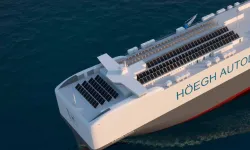The attack, which occurred this week, marks one of the most serious incidents involving the Houthis targeting ships since the conflict in Israel began. While most previous attacks caused minimal damage, the Rubymar faced a more substantial threat. The vessel, partly submerged with its engine room and one compartment underwater, will undergo salvage operations.
The Houthis, an Iran-backed group, initially claimed to have sunk the ship, but satellite imagery and confirmation from the ship's operator debunked this assertion. Following the attack on Monday night, the crew issued a distress call and abandoned ship. A coalition warship responded, and the crew, consisting of 11 Syrians, six Egyptians, three Indians, and four Filipinos, was safely transported to Djibouti.
The Rubymar, flying a Belize flag and owned by Golden Adventure Shipping, carried a significant cargo of nearly 22 metric tons of fertilizer classified as "high consequence dangerous goods" by the International Maritime Organization. The ship's operator did not provide details about the cargo.
Despite efforts by a coalition of countries, including the United States and Britain, to defend vessels and retaliate against Houthi attacks in the Red Sea, incidents persist. The U.S.-led coalition recently conducted "self-defense strikes" against Houthi drones and missiles in Yemen, aiming to prevent further threats to commercial ships.
The Rubymar incident highlights the ongoing challenges faced by maritime operators in the region, emphasizing the need for continued vigilance and collaborative efforts to ensure the safety of vessels navigating these waters.






